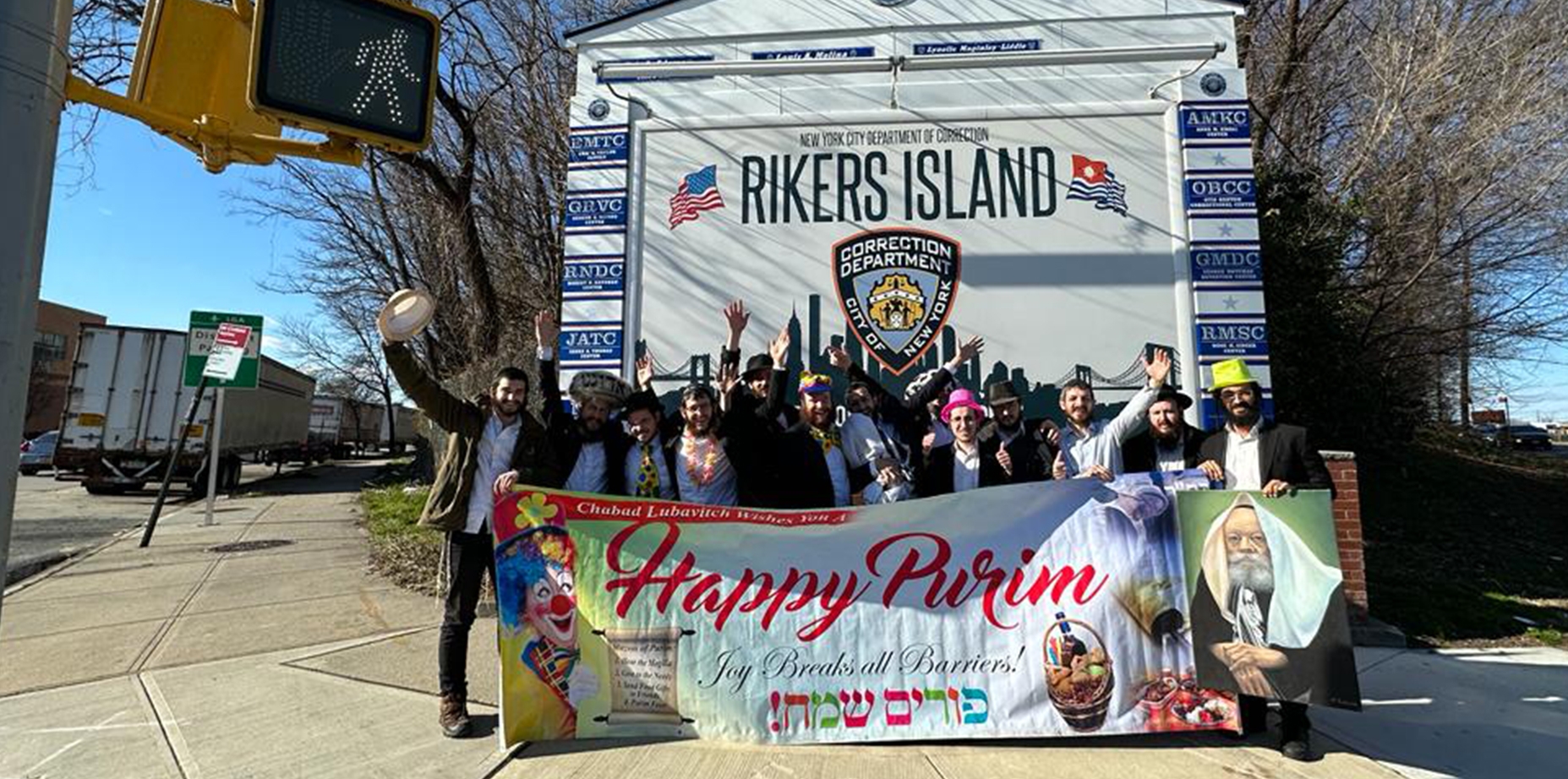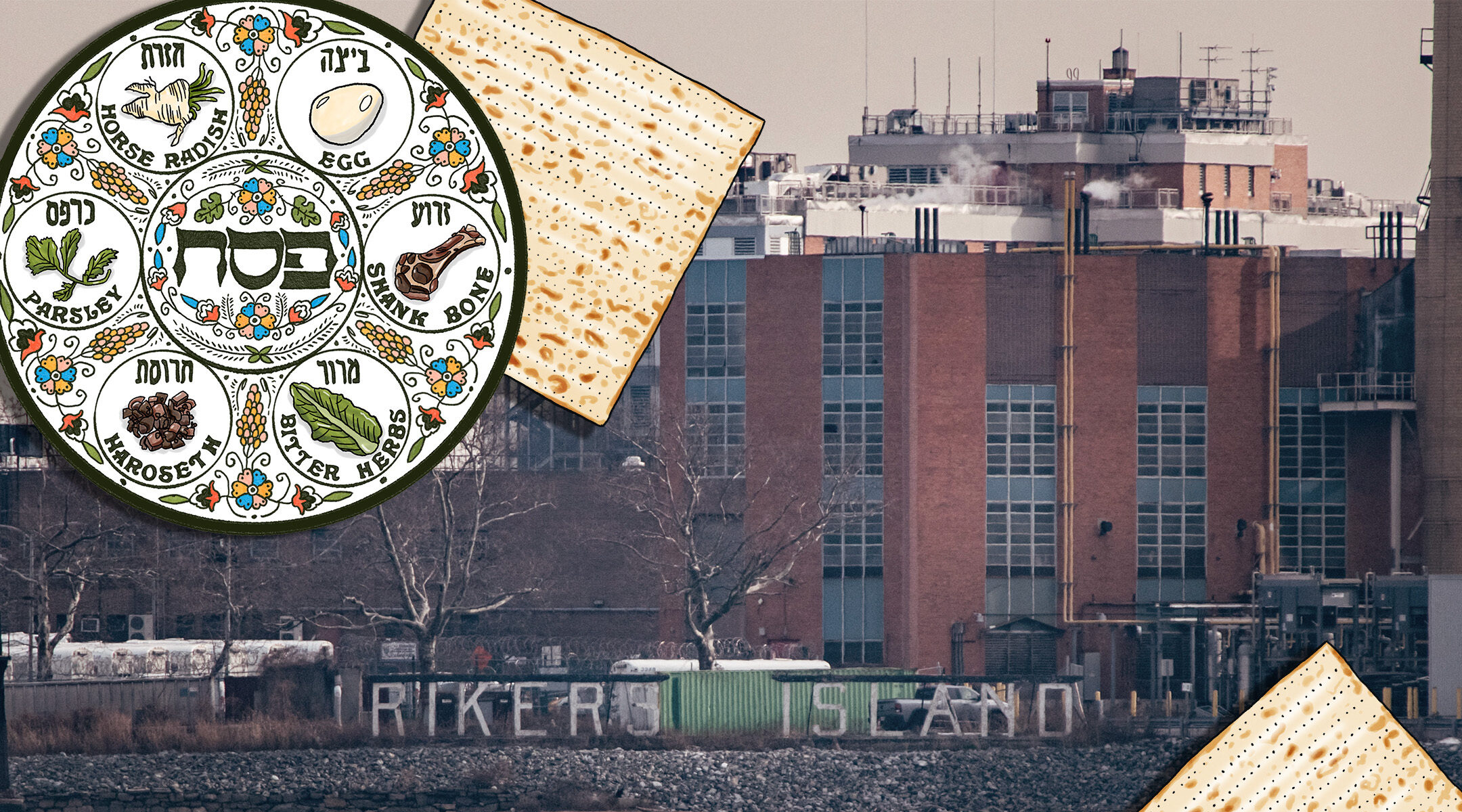(New York Jewish Week) — Miriam Tohill, a Jewish chaplain intern at Rikers Island, is looking forward to co-leading Passover seders for Jewish inmates this year for the first time. But conditions at the New York City jail complex are not ideal.
For the seders, held on the first and second nights of the holiday, some 70 to 100 inmates will be bussed from different parts of the island complex to a gymnasium that “feels like a high school gym,” said Tohill, 32, who uses the pronouns “she” and “they.” Sending participants to hunt for the afikoman, a hidden piece of matzah, is “discouraged,” she added, “for obvious reasons.”
The seder tradition of putting pillows on the room’s flimsy folding chairs, they said, is likewise prohibited. And while the door of the gym, rather than a door to the outside, will be opened for Elijah the prophet, they said, “the symbolism is obviously muted.”
Beyond that, Tohill added, it may be a challenge to create a festive mood. Corrections officers will be sitting on bleachers at the side of the room, which has a “squeaky floor, very tall ceiling, [and] terrible acoustics.”
Nonetheless, Tohill expects the seders at Rikers to be filled with meaning. She and others who work with Jewish inmates at the jail say that the holiday — which celebrates the ancient Jewish exodus from slavery to freedom — takes on a different resonance when celebrated by people currently behind bars.
“It’s both easier and harder to talk about slavery, freedom and hope when you’re incarcerated, but we’re all hoping for freedom and rehabilitation and growth in the future,” said Rabbi Gabriel Kretzmer Seed, Rikers’ Jewish chaplain. “People had beautiful insights about what freedom means to them, especially talking about how they feel free even when they’re incarcerated. I was very inspired by that.”
Seed, who received ordination from Yeshivat Chovevei Torah, the liberal Orthodox seminary in the Bronx, began working as a chaplain at Rikers in 2018. The jail has been criticized for harsh conditions, which include evidence of inmates caged in tiny showers and sleeping on floors next to a pile of excrement. The complex has also been the site of suicides, beatings and more. Nineteen people died at Rikers in 2022 — the jail’s highest death rate since 2013, and the city is required by law to close it by 2027, though whether that will be possible is unclear.
Seed said that while Rikers can be a volatile and intense environment, it has also given him a sense of gratitude, highlighting the Jewish concept of teshuva, or repentance, and the idea that everyone deserves a second chance. Seed said Rikers’ Jewish inmates come from a range of religious backgrounds, from haredi Orthodox people educated in yeshivas to others who decided to explore their Judaism once they were incarcerated. He holds weekly services at the jail that draw up to 12 attendees; this week’s teachings discussed the concepts of freedom and slavery as a precursor to the seders.
“I’m kind of buoyed by those values,” Seed said, referring to teshuva. “When I’m having a rough day, I leave my office, go to a housing area, and people are just so grateful for even a few visits, a few minutes when I step into their housing area, or when I get to teach and engage with people, and that just lifts me up and reminds me why I do this work.”
Year round, Rikers Island offers kosher food, which is provided by the city. Seed and Department of Corrections officials would not provide specifics on where the food comes from, saying only that it comes from “different caterers.” And matzah isn’t only available on Passover: Jewish inmates eat the unleavened bread year-round at Rikers because it is a kosher food option that is easily available.
There are Orthodox volunteer groups that help bring kosher food into the jail, including members of L’asurim, a nonprofit that supports prisoners, and the Lubavitch Youth Organization, a branch of the Chabad Hasidic movement.
Rabbi Shmuel Tevel, who is active in the Lubavitch group, told the New York Jewish Week that he visits Jewish inmates regularly at Rikers and other prisons across the state. “For an inmate sitting in a prison cell in those darkest moments, in a state where they feel they’re at the end of their rope, they need to tie a knot and hang on,” he said. “That’s what we give them.”

The Lubavitch Youth Organization outside of Rikers Island doing outreach work during Purim. (Courtesy)
Ahead of Passover, his group is delivering 40 pounds of matzah, along with grape juice, haroset and vacuum-packed seder plates to some cells whose inmates won’t be allowed to attend the seder.
Zalman Tevel, Shmuel’s brother, who runs the group’s volunteer initiative at Rikers, told the New York Jewish Week that he spoke to a guard after visiting inmates during the holiday of Purim last month, and the guard told him the inmates were “in a better state.”
“They are closer to God,” he said. “It leaves a very good impact.”
Tohill described her work on Rikers, which includes working with inmates in other ways, in similar terms. Tohill said the work allows her to provide Jewish teachings in “a place that has so little space for joy, or God.” She compared the seder at Rikers to the tabernacle that the ancient Israelites built in the desert.
“We put all this care into it, knowing that it’s temporary, and we’re going to take it down again,” Tohill said. “We are in the wilderness and desperately need a place to meet Hashem. It is so temporary and imperfect, but that makes it even more worth putting the time into.”
For Tohill, co-leading the seders is part of their master’s project at the Union Theological Seminary, a traditionally Protestant seminary in Manhattan that now focuses on “training people of all faiths and none who are called to the work of social justice in the world.” Tohill’s project explores the meaning of Passover for oppressed people.
“I was in a position to ask, what does this Seder do for us spiritually, emotionally, communally?” Tohill said. “What does it promise to us if we have no access to freedom for people who are incarcerated? That became a big question for me, a theological question about what does this ritual do and how do we as Jews think about liberation?”
Tohill, who lives in the uptown Manhattan neighborhood of Washington Heights, said that some of the inmates have written about their personal stories and will share how they relate to Passover at the seder.
“We have congregants who have written poems about what sense they make of the Exodus story or of the four cups of wine,” Tohill said, referencing a central ritual of the seder. “We have congregants who have done drawings about their family that, to them, feel related to the Passover story in different ways.”
Requests to speak to an inmate planning to attend a seder, or to see inmates’ drawings or writings, were denied by the Department of Corrections.
Tohill called Rikers “a broken system” and said celebrating Passover feels particularly urgent there. They compared Rikers Island to “a floating trash heap in the middle of the ocean that we don’t want anyone to notice.”
“Passover is an opportunity to notice and ask who is being made invisible,” Tohill said. “The rest of the people in New York City who are not directly impacted by the prison industrial complex get to pretend it’s not happening. I would like to ask that, this Pesach, people take the opportunity to stop pretending.”
The New York Jewish Week brings you the stories behind the headlines, keeping you connected to Jewish life in New York. Help sustain the reporting you trust by donating today.





